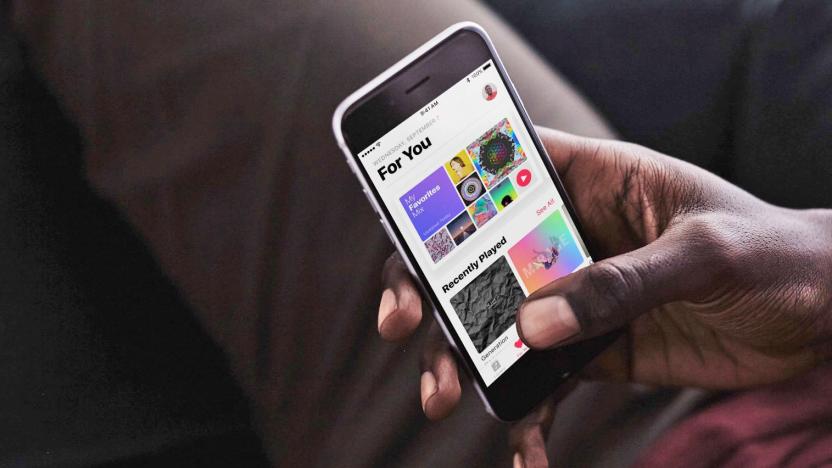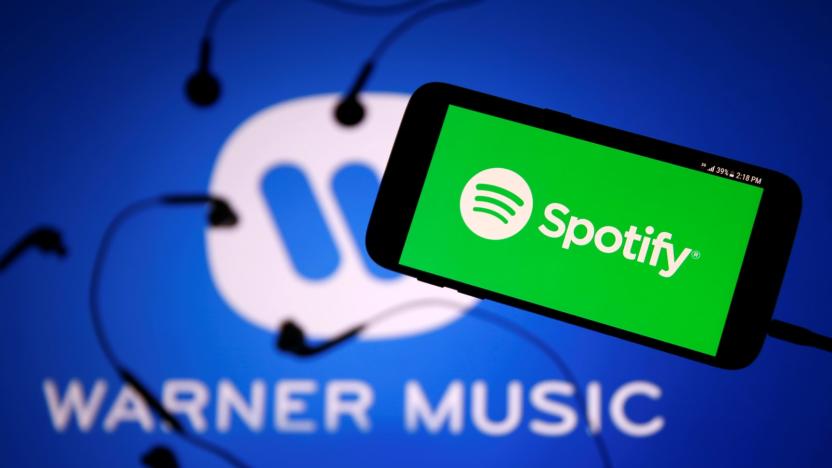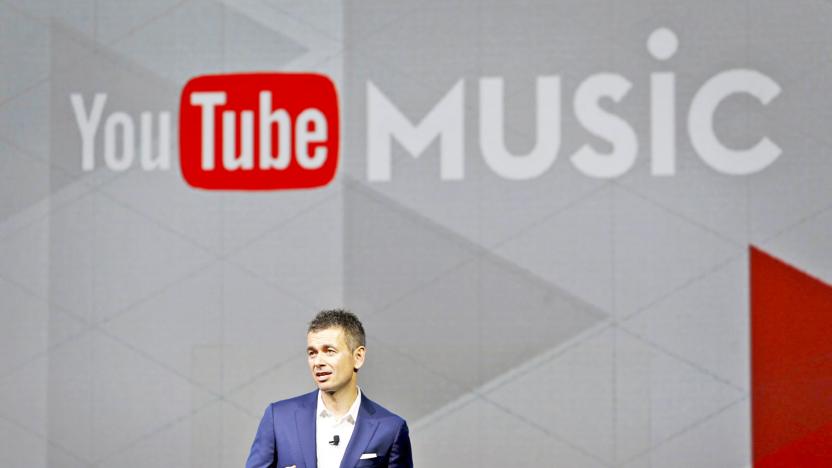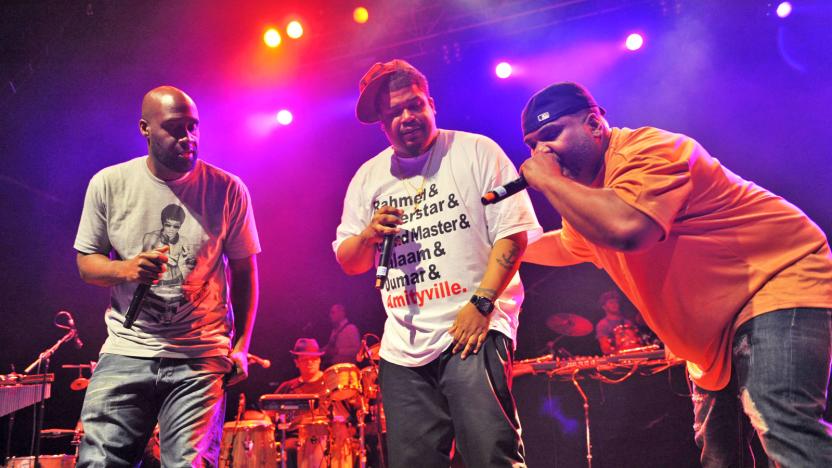warnermusic
Latest

Facebook inks deal with Warner Music for tunes in shared videos
Using background music that you don't own or license the rights to in a video is enough to get it pulled from Facebook. That's why the social network has been pursuing licensing deals with music labels. Now, Variety reports that Facebook has signed a deal with Warner Music Group that allows users to create, share and upload videos to Facebook containing the label's music. This wraps up the "Big Three" music labels, as the social network signed deals with Universal and Sony in December and January, respectively.

Apple reportedly strikes new licensing deal with Warner Music
Apple Music users will be able to enjoy tunes from Ed Sheeran and Bruno Mars for the foreseeable future. Fresh off its recent deal with Spotify, Warner Music has signed off on an agreement with the tech giant, according to sources that spoke to Bloomberg. The deal is Apple's first with a major label since the launch of its streaming service two years ago.

Spotify's deal with Warner Music clears path to going public
Spotify just signed a deal with Warner Music to secure its artists for the streaming service's users worldwide. This is the last big label after Universal Music Group, Merlin and Sony to renew ties with Spotify, and now pretty much everyone's on board.

MelodyVR's music app will have songs from the biggest labels
When MelodyVR finally launches its virtual reality platform for music, it'll have experiences to offer from all three major record labels. After signing up both Warner and Universal Music within the past few months, it has now forged (PDF) a worldwide multi-year licensing and distribution deal with Sony Music Entertainment. The startup calls the team-up "an extremely significant milestone," since it will now be able to use Sony's vast catalog, which includes music from artists signed by Columbia, Epic, Legacy, Masterworks, RCA Records, Sony Classical, Sony Music Latin and Syco Music. According to VRFocus, experiences featuring Sony's tracks will launch on the platform, but the record label can use them elsewhere after some time.

YouTube and Warner extend their streaming music deal
YouTube's relationships with music labels have certainly been fraught, but it just managed to reach a truce with one of them... at least, for now. The streaming service and Warner have extended licensing deals that will make sure Warner and its artists get paid for legal streams. The terms of the deal haven't been revealed, but a memo from Warner chief Steve Cooper suggests the label is being particularly cautious this time around. The deals are "shorter than usual," he says, "giving us more options in the future." And there's no mistaking why Warner is reluctant to commit for the long haul -- Cooper is convinced that YouTube is taking a lackadaisical approach to fighting piracy.

De La Soul's samples are why its classic albums stay offline
Have you wondered why De La Soul is more than happy to offer its newer albums online, but has had so much trouble getting its classics (Stakes Is High and earlier) online that it gave them away at one point? You now have a good, if imperfect, explanation. Their label, Warner Music Group, tells the New York Times that its staff "don't believe it is possible" to clear all the samples in early tracks for digital music services. It doesn't explain why those samples are being held back, but the group's current sample clearance agent suspects that many of those samples may have been cleared improperly, sometimes through informal agreements. It's also possible that many of the sample deals didn't account for non-physical releases, so Warner might have to start from scratch.

'Happy Birthday' settlement puts the song in the public domain
Since 1988, Warner/Chappell has had an iron grip on the copyright for "Happy Birthday to You." Artists couldn't sing it on a recording without paying up, even though it's virtually ubiquitous in real life -- it's widely considered the most popular English-language song in history. At last, though, logic appears to be taking hold. In the wake of a lengthy class action lawsuit, Warner has agreed to a $14 million settlement that will put "Happy Birthday" in the US public domain well ahead of 2030, when the label expected the copyright to run out. So long as the ruling holds, you can expect to hear those very familiar strains all over music, movies and TV shows in the near future.

Google officially lands deal with Warner Music Group
Make no mistake -- landing a deal for streaming with Warner Music Group is no easy chore. Search for 'Red Hot Chili Peppers' on programs like MOG, and you'll probably be sorely disappointed in what results are returned. Tucked within Google's Nexus blowout this morning was this nugget: the search giant has finally nailed down a deal with Warner, who will be "adding its full music catalog with new songs coming each day." In other words, this completes the puzzle necessary for Google to confess that it's "working with all of the major record labels globally," with this particular deal paving the way for acts like Green Day, Madonna, Neil Young and RHCP to appear soon in the Play Store. Specifics on which artists are coming when remain elusive, but feel free to refresh like mad if you're so inclined.

Warner Music Group says streaming services now account for 25 percent of digital revenue
We've been seeing plenty of evidence that streaming music services like Spotify, Pandora and Rdio are pulling in more folks than ever, and we now also have a good idea of how that growth is affecting the bottom lines of music labels. In its third quarter earnings report, Warner Music Group revealed that streaming services now account for a full 25 percent of the digital revenue for its recorded music group. As AllThingsD reports, that translates to 8 percent of Warner Music's total revenue for the quarter, or about $54 million in all. What's more, that growth in streaming appears to be a net plus for the company all around, as it's apparently not cutting into traditional sales of digital music (at least, not yet), and is also bigger than the decrease in sales of physical media.

Amazon rumored clinching major labels for cloud music rights, iTunes Match feels the heat
When we last checked in, Amazon was thought to finally be pushing for full music rights in its Cloud Drive and Cloud Player services. It might be a smooth operator at the negotiating table: subsequent tips to CNET maintain that the top four major labels (a currently-independent EMI as well as Sony, Universal and Warner) have all signed deals that will let Amazon offer the same scan-and-match music downloads and streaming as Apple's iTunes Match. The pacts would let Amazon offer access to every song a listener owns without having to directly upload each track that wasn't bought directly from Amazon MP3. Aside from closing a conspicuous gap, the deal could end a whole lot of acrimony from labels who were upset that Amazon preferred a free-but-limited service over having to charge anything. The online shop hasn't said anything official yet (if at all), but any signatures on the dotted line will leave Google Music as the odd man out.

Warner Music reporting more stable sales, propped up by iTunes and streaming services
There's finally some good news in the music business, but don't get too excited, it's not that good. Warner Music reports (before we hear about the full industry sales from 2011) that its sales were steady last year, at $780 million. In this case, steady is better than a drop, which is what most of the music industry has seen lately. Warner says that digital revenue makes up 28% of the company's sales, a number that's jumped up 17% in the last year. iTunes and other downloadable services accounted for $205 million in Warner's revenue in the last quarter. Streaming services are becoming more lucrative as well. While Spotify and other streaming services have only brought in $15 million so far, that share of the market is growing by 36%, much higher than downloadable music's 15% growth. In other words, streaming revenue isn't a huge deal yet -- but it might be very soon if trends continue. Plus, analysts are saying that streaming revenue (which comes from customers who pay a monthly fee for an all-you-can-listen-to music service) often comes from those Napster users who didn't pay at all before, which means that it's brand new revenue for the music companies. Not as much revenue, obviously, as if those customers actually bought every CD they listened to, but a music industry that's been flagging for the better part of a decade will probably take what it can get.

China's Baidu licenses music from major US record labels for streaming and downloads
In a move suggesting they might be ready to accept the realities of the internet era, major US record labels have reached a deal with Chinese search engine company Baidu. The agreement between the search giant and One-Stop China, a joint venture of Universal, Warner and Sony BMG, will result in licensed tracks popping up in searches instead of pirated ones and resolve years of legal wrangling between the two sides. Baidu launched its ting! social music service earlier this year with support from local labels and EMI, while this new deal will see labels paid per-play, per-download and from advertising. Between this and the recent launch of Spotify in the US the cheap and easy fun of music piracy is slipping away rapidly, if record labels continue to act sensibly then illegal downloads will soon be limited to hipsters ironically cracking open vintage editions of Soulseek.

Apple signs Warner Music to its cloud-based music service
Need another sign that iTunes will soon be floating your library up to the cloud? Look no further than confirmation of Apple signing Warner Music, a deal that should see the label's music available in its upcoming streaming iTunes service. This is in addition to last week's confirmation that two major labels signed on, though its unclear whether Warner is part of the pair or is, indeed, a third. That might leave only one of the major labels left unsigned -- or maybe Apple's already locked down all four but doesn't want to kiss and tell. Yet.

Apple working on unlimited downloads of purchased iTunes music, setting MobileMe free?
You know all that rumor and speculation about Apple launching a subscription-based streaming music service? Forget it -- at least until the next rumor comes along. Bloomberg is citing three people with knowledge of private talks between Apple, Universal Music, Sony Music, and Warner Music to make purchased music more easily accessible to iTunes users. Two sources claim that an agreement could be announced by midyear. Contrary to popular speculation aroused by Apple's purchase of Lala, they're not talking about streaming music from Apple's new North Carolina data center scheduled to come online in the spring. According to Bloomberg's sources, Apple is instead, planning to offer unlimited downloads to any device linked to the same iTunes account. So, purchase a track on your iPhone and download it again for free to your iPad without having to go back and tether the mobile device to your PC or Mac for a sync. Hard disk crash? No worries, there's a permanent backup in the cloud. Of course, there's nothing preventing Apple from providing unlimited downloads in parallel with a streaming service except for the labels and artists who prefer the higher revenues paid out by download services. Then again, if it was left to them we'd still be buying our music on $15 CDs. Incidentally, one Bloomberg source was also caught blabbing about Apple's plans to overhaul the MobileMe service to store pictures, video, and other online content sometime this year. Better yet, it could drop from $99 per year to free -- something already reported by the Wall Street Journal a few weeks ago.

Warner Music talks trash about free streaming services, keeps using them
Warner Music Group CEO Edgar Bronfman Jr. isn't happy with free music streaming services. Shocking, right? Coming out yesterday with a barrage of disparagement for online streamers like Spotify and Last.fm, Bronfman Jr. made it clear that they do not represent "the kind of approach to business that we will be supporting in the future." Why is that, Eddie? The man in charge seems to think that paid subscription models are the future, because "the number of potential subscribers dwarfs the number of people who are actually purchasing music" online. That's wonderful and all, but he neglects to tell us the specifics of how and why Warner will succeed at something that every publisher would love to have, but none have managed to translate into reality yet. Additionally, WMG is not withdrawing its music library for the moment -- something a lot of publications seem to have erroneously reported (see Spotify tweet below) -- which leads us to believe the entire spiel is more of a renegotiating ploy than a concrete statement of intent. [Thanks, Wiggy Fuzz]

Warner CEO: iTunes price increase led to lower sales, recession might also factor in
Don't pat yourself on the back too much for calling this one, but Warner CEO Edgar Bronfman Jr. has now confirmed what many have suspected: higher iTunes pricing has led to slightly slower sales. Specifically, he says that while the variable pricing introduced early last year has been a "net positive" for the company, revenue growth on iTunes slowed to just eight percent in the last quarter, compared to a hefty 20 percent a year earlier. He is also quick to point out, however, that raising prices 30 percent during a recession may not have been the best idea in hindsight. Interestingly, Bronfman seems to think that e-books actually stand a better chance at holding to up to price increases than music, noting that the "book publishing industry, on the iPad, has much more flexibility than the music industry had."

iTunes LP broken for indie record labels?
Update: ElectricPig is reporting on 10/13 that an Apple spokesperson said the LP format will be opened up for all, indies and majors alike. There's word from an indie record-label that iTunes LPs are not for the indies. Introduced at Apple's "It's Only Rock and Roll" event in September, the iTunes LP format adds "bigger than a matchbook" album art, song lyrics, video clips, and other extra content to albums sold through the iTunes store. digg_url = 'http://digg.com/apple/iTunes_LP_broken_for_indie_record_labels'; Brian McKinney of Chicago-based label Chocolate Lab Records saw some promise in the new format and started looking into the idea of producing for iTunes LPs himself. But the truly small labels may have a hard time getting in. McKinney spoke to the digital distribution manager at his label's distributor, who reportedly told him that Apple charges a $10,000 production fee for iTunes LPs. $10,000 may be less than the heads of Warner Music Group, Sony BMG, Universal Music Group, and EMI spend on breakfast, but could be cost prohibitive for the little label that could (if it had $10,000 handy for each of its acts). It's not just the cost that prohibits the little labels. According to McKinney, it's also Apple. McKinney says his dude in distribution was told "that LPs aren't being offered to indies and that there are only about 12 LPs being offered right now." "Foul, foul, filth and foul," cries Cult of Mac's Pete Mortensen. Like a financial analyst moving a stock from "buy" to "sell," Mortensen says iTunes LP has gone from "the first digital album good enough to criticize," to "the first major content misstep in the history of the iTunes Store." Assuming that Chocolate Lab's distributor info is on the up-and-up, Mortensen thinks iTunes LP is "less a new format for music than it is a new form of paid advertising on the iTunes store."

iTunes Store to add enhanced liner notes, extra media to album purchases
Digital music purchases have been dominating the market for some time now as physical CD purchases continue to fall. For Apple, a significant lead over the rest of the music proprietor world is not enough: according to the Financial Times, the company is now working together with the four largest record labels in the business to add new features to accompany digital music purchases through its iTunes Store in hopes of stimulating full album purchases. [The FT also reports, without hedging, that Apple's "media pad" tablet device will ship in time for the holiday shopping season. According to the paper, the long-rumored iPad is intended as a full-featured portable computer and video & music player, like an oversized iPod touch, including wireless data connectivity but no built-in phone functions.] Apple has formed an alliance with EMI, Sony Music, Universal Music Group, and Warner Music to bundle whole albums with perks like interactive booklets, digital sleeve notes, and video clips. By doing so, Apple hopes to increase sales of the albums over single track purchases, a sales model that has been immensely popular in the advent of digital music. The project, codenamed "Cocktail," is intended to recreate the former experience of album-purchasing, where you could browse the liner notes, follow lyrics, and look at the album artwork as the music played. Executives have said that users will even be able to play music straight from the proposed interactive booklets without having to use iTunes. Of course, the main motivation for increasing album sales is to increase profits, as albums have a higher margin than individual songs. This change is one that should have taken place a long time ago- having to search for lyrics on shady, ad-ridden websites should already be a fading, shudder-inducing memory (though liner notes have been available on some albums, a change across the board has yet to take place). As items like liner notes and photos are possibly the last benefit that physical CDs can offer over digital purchases, this may turn out to be a very serious blow to the CD market. The iTunes Store album add-ons are set to roll out in September.

Warner Music joins Nokia's Comes With Music download program
The latest label following BMG to join Nokia's Comes With Music service bandwagon is none other than Warner Music Group. The third-largest label joins the powerful cadre of labels on the service, which as of this posting lacks only EMI for a full major label lineup. As a reminder, the service allows you to download music for 12 months and then keep it as long as you own the device or transfer to a PC. Now, of course, we just need to wait for the devices to roll out. [Via Yahoo News]

Amazon starts dishing out DRM-free Warner Music MP3s
We're not sure if Amazon's forthcoming DRM-less Super Bowl promotion has anything to do with it or not, but the company has just announced that its finally brought Warner Music Group into its MP3 fold, with a slew of music from the label now available for download without any of those pesky restrictions. According to Dow Jones, the pair also plan to offer other "digital music products," including album bundles with exclusive tracks, although details are few and far between beyond that. Still no word from Sony BMG on its intentions to go DRM-free (with Amazon or anyone else), but it sure looks like things are increasingly stacking up against them.









